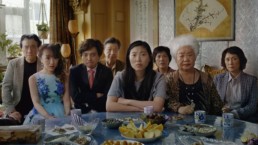‘The Farewell’ is a Clever and Compassionate Modern Classic
One of the film's first big laughs comes from a simple flash of onscreen text reading: “Based on an Actual Lie”.
Every January at the Sundance Film Festival, critics, audiences, and distributors gather in secular pilgrimage to usher in a new year in film history. All are hoping to lay eyes on new classics and cult hits as they make their world premieres. At 2019’s festival, these puffy-jacketed crowds were graced with a directorial voice so smart and steady that most everyone in attendance shared in the rush of declaring, “Oh, we’ve just found a LOT of people’s new favorite movie.” And it’s not just festival hype. ‘The Farewell’ is poised to take its place alongside the greatest family dramas, and comedies, in recent history. Here’s what you need to know.
One of the first big laughs of The Farewell comes from a simple flash of onscreen text reading: “Based on an Actual Lie”. It’s a cheeky twist on the self-seriousness way many films announce their basis in reality. The “actual lie” the film is based on was fed to writer-director Lulu Wang’s grandmother after she received a stage four cancer diagnosis. Wang’s family kept the diagnosis secret so that their funny and formidable grandma (affectionately called “Nai-Nai”, the Mandarin term for paternal grandmother) could live her final months unburdened by knowledge of her own illness. The only family member who wasn’t on board for this deception was Lulu Wang, the twenty-something granddaughter, raised in America since elementary school. In this semi-autobiographical adaptation, Wang’s cinematic counterpart is Billi, a struggling writer played with astonishing vulnerability and verve by Crazy Rich Asians breakout star and musician Awkwafina.
Billi reluctantly agrees to keep quiet. However, this means she, and other far-flung family members, now need an excuse to gather around Nai-Nai in China without arousing suspicions. So they pester Billi’s cousin to push his marriage timeline into hyper-drive, staging a slap-dash wedding ceremony with his girlfriend of three months as a pretext for rounding up all the relatives.
Billi’s family is doubtful that she can tamp down her emotive personality enough to keep the secret, and the film draws much comedy out of Nai Nai’s grandmotherly fretting that Billi looks sick and is making odd, intense faces as they plan the wedding. Nevertheless, Billi strives to comprehend and respect the family approach to Nai Nai’s illness.
Now, I’ve noticed when describing this plot to others that, for some, there’s a built-skepticism that comes with hearing about another drama dealing with cancer, familial conflict, and secrecy. I too, wasn’t sure this would be a favorite for me, as these stories can be trite and over-eager to give easy catharsis to everyone by the end of their two-hour runtimes.
But you’d look pretty silly dismissing this film, because Lulu Wang’s richly detailed characterizations, masterful movements between tones, and unique cross-cultural material sweeps these concerns away like so much dust, leaving us with a fresh and open-hearted take on age-old problems of loss and bonding.
Her directorial control of mood and character growth are astounding. She tasks herself with balancing an ensemble cast of aunts, uncles, and cousins and succeeds with a grace rarely equaled since classic 90’s dramedies like Eat Drink, Man Woman, while mining even richer veins of emotion. And many of the most aching emotions belong to the conflicted Billi. So how is Awkwafina in her first dramatic role?
Best known for comic relief in Crazy Rich Asians and comic rapping online, the world was wondering what a more subdued performance from Awkwafina might look like.
Her Billi is an incredible creation and one of the most fully-realized young characters of the decade. Combining the best of Awkwafina’s slouchy, easy-going comic persona with a deeply satisfying emotional arc that made me cry six separate times, both star and director deserve immense credit for bringing Billi to screen. I don’t want to spoil the finer points of Billi’s journey, just know that it’s a lovely exploration of the disorienting effects of distance and time, particularly for a child of immigrants, even in an era when geographical realities can be somewhat, though never entirely, overcome by a phone call.
A list of things that Wang and Awkwafina convinced me to cry at through the power of cinema include: birds, arm exercises, drunk wedding speeches, more birds, and, above all, architecture.
So when can you too experience this cascade of tears that will soothe your spirit and moisturize your skin?
The Farewell does not have an announced release date yet, but it was picked up by the much-celebrated distribution and production company A24, who is known for visually-splendid critical darlings of all genres such as Moonlight, Lady Bird, Eighth Grade, Room, The Witch, Swiss Army Man, and Hereditary.
This is pure speculation, but a Fall 2019 release may be likely if they intend to mount Oscar campaigns for Awkwafina and/or Lulu Wang. Which they most definitely should. Though a summer release could be fitting as well for this family-oriented gem.
The only sure thing is, once this film arrives in the larger world it will be a good long time before any of us are willing to say farewell to the conversations (and careers!) that will be launched by this clever, compassionate modern classic.
This review was originally published on February 11, 2019, during the Sundance Film Festival.
THE FAREWELL (2019)
Starring Awkwafina, Tzi Ma, Diana Lin
Directed by Lulu Wang
Written by Lulu Wang
Distributed by A24. 98 minutes. Opening 7/12 at ArcLight Hollywood and The Landmark.
Kailee Andrews
Kailee holds a Communication Arts B.A. from the University of Wisconsin. At 21, she programmed her first film festival for an audience of 4,000+ on campus. Since then, it's been all about sharing the cool arts and crafts of cinema.

